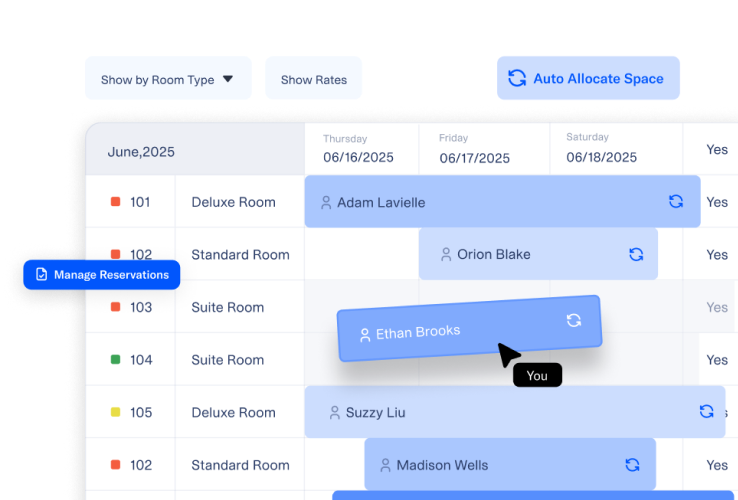Table of Contents
Join Thousands of Hotels Thriving with roommaster
The transition to roommaster is straightforward and efficient. Our implementation team handles data migration including reservations, guest profiles, and historical information.

Travelers these days have endless choices when it comes to booking accommodation. This convenience is largely made possible by online travel agents (OTAs)—third-party platforms that connect hotels with millions of potential guests worldwide.
The importance of OTAs extends beyond just bookings. They play a critical role in shaping guest expectations through reviews and ratings, driving brand awareness, and enabling small and independent hotels to compete with larger chains. Using tools like a hotel channel manager, hotels can efficiently manage their listings across various OTAs, ensuring consistent pricing and availability without the hassle of manual updates.
But what is an online travel agent, and why are they so crucial to the hospitality industry? In this guide, we’ll explore what are they, the top OTAs for hotels in 2025, the benefits and challenges of working with them, and strategies to maximize your success on these platforms.
Whether you’re a boutique hotel owner or managing a larger property, this comprehensive overview will help you navigate super interesting world of online travel agents.
An online travel agent (OTA) is a digital platform that connects travelers with accommodation providers, offering a streamlined way to book hotel stays, flights, car rentals, and other travel-related services. OTAs act as intermediaries, giving hotels a broader reach while simplifying the booking process for guests.
For travelers, OTAs are a one-stop shop. Users can browse multiple properties, compare rates, read reviews, and book their entire trip—all in one place. For hotels, OTAs provide visibility to a vast audience they may not reach through direct marketing alone. Platforms like Booking.com, Expedia, and Airbnb are examples of OTAs that have become household names in the travel industry.
The functionality of an OTA typically includes:
When integrated with a channel manager, OTAs enable hoteliers to update room inventory and pricing across multiple platforms in real time, reducing the risk of overbookings and ensuring accuracy, however, OTAs operate on a commission-based model, charging hotels a percentage of each booking. While this provides valuable exposure, it’s important for hoteliers to balance OTA partnerships with strategies to drive direct bookings, including using your own hotel booking engine, which eliminate commission fees and build stronger guest relationships.
Online travel agents (OTAs) offer a range of advantages for hotels, making them an essential component of modern hospitality marketing strategies. While they do come with commission fees, the benefits they bring often outweigh the costs, particularly when used strategically. Let’s take a look at some of them:
OTAs provide hotels with access to a global audience of travelers. With a channel manager, hotels can instantly synchronize room availability and pricing across all their OTA listings, minimizing discrepancies and enhancing guest trust. Even smaller properties can reach millions of potential guests, thanks to the extensive reach of platforms like Expedia or Booking.com. This increased visibility is particularly beneficial for independent hotels that may lack the resources for extensive marketing campaigns.
OTAs simplify the booking process for both guests and hoteliers. Guests can compare rates, view photos, and read reviews in one place, while hotels benefit from an automated booking system that reduces administrative tasks.
Verified guest reviews on OTA platforms help build credibility. Positive reviews attract more bookings while reassuring hesitant travelers about the quality of your property.
Most OTAs offer data analytics tools, enabling hoteliers to understand booking trends, guest preferences, and seasonal demand. These knowledge can help hoteliers with pricing strategies and marketing campaigns, helping you stay competitive.
OTAs allow hotels to fill rooms during slower seasons by offering discounts or packages to targeted audiences. This ensures consistent revenue flow, even when direct bookings are low.

Online travel agents (OTAs) act as intermediaries between hotels and potential guests, simplifying the booking process and expanding a hotel’s reach. Also, a channel manager serves as the bridge between a hotel’s hospitality management software and OTAs, ensuring seamless communication of room availability, rates, and booking updates. Here’s a closer look at how they operate:
Hotels create a profile on the OTA platform, showing their offerings with high-quality images, detailed descriptions, and competitive rates. Some platforms even provide tools that will help your hotel optimize your listing for even better visibility.
Guests visit the OTA platform to search for accommodations based on their preferences, such as location, price range, amenities, and travel dates. The platform then provides a curated list of options, made specifically for each user’s criteria.
When a traveler selects a property, the OTA helps with the booking process. Guests can complete their reservation in a few clicks, thanks to user-friendly interfaces and secure payment gateways.
OTAs earn revenue through a commission-based model, typically charging hotels a percentage of each booking made through their platform. The exact commission varies by platform and property type, generally ranging from 10% to 30%.
Some OTAs go beyond bookings, offering services like upselling experiences (tours, spa packages), marketing assistance, and analytics. These added features can help hotels maximize revenue and make the guest experience even better!
Keep in mind that it’s important to pair OTA listings with a good booking engine, including strategies to encourage direct bookings is essential to reduce commission costs and retain more revenue, also, direct booking helps with keeping a closer contact with your guests.
Online travel agents (OTAs) have revolutionized the hospitality industry, offering hoteliers a powerful platform to attract guests, increase bookings, and compete in a crowded market. Here’s how OTAs benefit hoteliers:

OTAs provide hotels access to millions of potential guests worldwide. With their established presence and marketing budgets, these platforms ensure your property gets noticed by travelers you might not otherwise reach.
When occupancy rates dip, OTAs can help fill your rooms by showing your property to travelers actively searching for accommodations. Features like last-minute deals or special promotions can make your property more attractive.
OTAs often invest heavily in online advertising, SEO, and social media campaigns, positioning your hotel in front of a broader audience. These efforts save hoteliers time and resources while driving visibility.
Most OTA platforms allow guests to leave reviews, which can serve as valuable feedback. Positive reviews enhance your hotel’s credibility, while constructive criticism helps identify areas for improvement.
Many OTAs provide data insights, including booking trends, market demand, and traveler demographics. Hoteliers can use this information to refine pricing strategies and tailor offerings to target audiences.
OTA integrations with property management systems (PMS) make it easy for hotels to update room availability, rates, and bookings in real-time, reducing manual work and minimizing overbookings, and if additionally you include a channel manager, hoteliers will have even more tools to update multiple OTAs simultaneously, and allocate more time to improving guest experiences.
While OTAs are indispensable for reaching a wider audience and driving revenue, balancing OTA reliance with strategies for direct bookings ensures hoteliers retain more profit and foster direct relationships with guests.
{{pms-one}}
Online Travel Agents (OTAs) have become indispensable for hotels trying to maximize visibility, reach diverse audiences, and boost bookings. Here’s a detailed look at some of the most significant OTAs in 2025, along with their unique advantages and tips for hoteliers:
A pioneer in the OTA space, Booking.com processes over 1.5 million room nights daily and operates in more than 200 countries.
Advantages of Listing on Booking.com:
Tip for Hoteliers:
Optimize your profile with high-quality photos and detailed descriptions to stand out in Booking.com’s competitive marketplace.
A titan in the OTA market, Expedia’s ecosystem includes brands like Hotels.com and Travelocity. Its expansive reach and user base make it a go-to choice for hotels.
Advantages of Listing on Expedia:
Interesting Fact:
Hotels listed on Expedia often see spillover traffic and bookings through its partner sites like Orbitz and Hotels.com, maximizing exposure.
Known for its massive amount of user reviews, TripAdvisor combines reputation management with booking capabilities through its Instant Booking feature.
Advantages of Listing on TripAdvisor:
Tip for Hoteliers:
Encourage satisfied guests to leave reviews on TripAdvisor to boost your ranking and attract more bookings.
Airbnb is renowned for its unique approach to hospitality, emphasizing non-traditional accommodations and local experiences. While traditionally focused on consumer-to-consumer rentals, its acquisition of HotelTonight has broadened its scope to include commercial listings.
Advantages of Listing on Airbnb:
Tip for Hoteliers:
Consider showcasing unique features of your property—such as a rooftop garden or locally inspired design—to align with Airbnb’s emphasis on authentic and unique experiences.
Focusing heavily on the Asian market, Agoda is ideal for hotels looking to attract travelers from this rapidly growing segment.
Advantages of Listing on Agoda:
Interesting Fact:
Agoda offers special promotions, such as “Member Deals,” which can give your property an edge in competitive markets.
As part of the Expedia Group, Hotels.com leverages its network to provide a robust platform for properties across the Western Hemisphere.
Advantages of Listing on Hotels.com:
Tip for Hoteliers:
Highlight exclusive offers for Hotels.com Rewards members to attract repeat guests.
Specializing in last-minute bookings, LateRooms is perfect for hoteliers looking to fill unsold inventory quickly.
Advantages of Listing on LateRooms:
Interesting Fact:
LateRooms sees a surge in activity during major UK events like Wimbledon or music festivals—ideal for capitalizing on local demand.
HRS, based in Germany, is a standout OTA for properties targeting business travelers.
Advantages of Listing on HRS:
Tip for Hoteliers:
Consider offering corporate packages or early check-ins to appeal to HRS’s business-focused audience.
9. Google Hotel Ads
Google Hotel Ads integrates with the search engine, delivering great visibility for hotels.
Advantages of Listing on Google Hotel Ads:
Interesting Fact:
Hotels using Google Hotel Ads report higher-quality leads, as the platform filters users by criteria like price range, availability, and amenities.
Dominating Southeast Asia, Traveloka is an emerging force in the OTA market. It specializes in budget-friendly options, targeting millennials and families.
Advantages of Listing on Traveloka:
Tip for Hoteliers:
Leverage Traveloka’s bundled deals (flight + hotel) to attract value-conscious travelers.
Managing listings on platforms like Booking.com and Airbnb becomes far more efficient with the help of a channel manager, which automates updates and ensures consistency. And again, ensure your OTA strategy is balanced with efforts to drive direct bookings through your own website.
{{channel-manager-one}}
Selecting the right online travel agent (OTA) for your property requires understanding your hotel’s unique needs, target market, and goals. Not all OTAs are created equal; some specialize in specific traveler types, while others focus on certain regions or price points. Here’s how to make the right choice:
Pro Tip:
Diversify your OTA strategy. Relying on one platform may limit your reach and increase vulnerability to market shifts.
To maximize the benefits of OTAs, it’s essential to approach these platforms strategically. Below are best practices for effectively managing your OTA presence:
Pro Tip:
Leverage analytics from OTAs to refine your pricing, marketing, and promotional strategies for maximum ROI.
{{booking-engine-one}}
An OTA is a digital platform that connects travelers with accommodations, flights, and other travel services. OTAs help hotels reach a broader audience and streamline bookings through a centralized system.
No, OTAs complement direct bookings but shouldn’t replace them. A balanced strategy leveraging both ensures higher revenue and guest loyalty. Use a good booking engine to leverage your strategy.
Commission rates vary by platform, typically ranging from 10% to 30%. The exact rate depends on the OTA, property type, and region.
Hotels can promote direct bookings by offering exclusive perks, implementing loyalty programs, and optimizing their websites with a user-friendly booking engine.
{{cta-strip}}



The transition to roommaster is straightforward and efficient. Our implementation team handles data migration including reservations, guest profiles, and historical information.
See how roommaster's unified platform can work for your property. Our team will walk you through features tailored to your specific needs and operations.